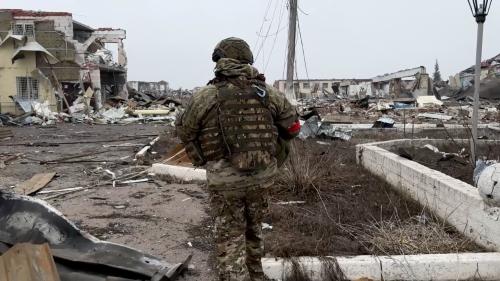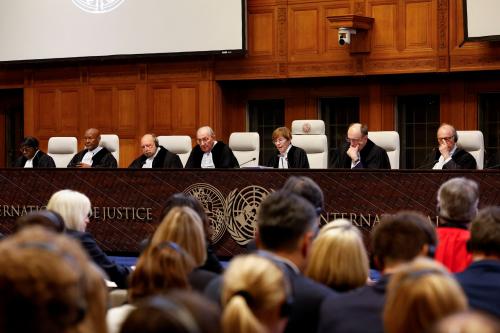Is Russia really weak?
In response to our recent article at Foreign Affairs titled Paper Tiger Putin, Sergey Aleksashenko argued on this blog that everyone should stop calling Russia weak. His response misses our main point—worse still, it is critically flawed when it comes to policy advice. (Pavel Baev’s response is a good one and we agree with many of his points, though we take a somewhat different approach here.)
We do not argue that Putin is weak as an individual. To the contrary, he is in a powerful position given his apparent popularity and the rise in nationalism in Russia. Rather, we argue—after examining Russia’s total strategic position today, as we have done extensively in our book “Russia’s Coercive Diplomacy” (Palgrave Macmillan, 2015)—that Russia’s recent moves have actually put it in a worse strategic position. Using aggressive military coercion and cyber tactics, as well as flaunting energy power, have not made the state any more powerful, nor have they helped Russia achieve its strategic objectives.
Aleksashenko correctly observes that leaders in the region are worried, and rightly so. But a deeper consideration of Russia’s foreign policy behavior does not prompt much concern about the sustainability of Eastern Europe—instead, the concern is rightly directed towards Russia. Each of its maneuvers have made it worse off than before: Moves against Estonia and Georgia have only pushed them closer to Europe and Western defensive alignments, and every Baltic state is now seemingly prepared for potential conflict and requesting more and more support from NATO. This is clearly not what Russia intended. Even Serbia, a traditional Slavic ally, is now participating in alternative pipelines, degrading Russia’s position in Europe even further.
We argue that Russia is weak after thoroughly considering outcomes, not by engaging in punditry and reacting merely to the latest news and provocations (which are sometimes imagined). We evaluate the country’s total position and weigh the costs it faces against the outcomes of past actions. By this analysis, Russia does not appear strong. If anything, the Russians bogged themselves down into an expensive quagmire in Donbass that is unlikely to end anytime soon. The United States was in a similar situation after Iraq and is only now refocusing on its true strategic priorities.
Energy is still key
Alesashenko asserts that we get our policy prescriptions wrong. How can it be wrong to suggest that Europe invest in alternative energy (which was not really our point, in fact) and alternative energy supply routes? Diversification is never a bad idea, and to depend so much on Russia for energy is clearly a weakness in Eastern Europe. As a recent piece at Monkey Cage demonstrates, Russia’s aggressive actions often come during times when oil prices are high; reducing Russia’s ability to leverage energy power can weaken the country in general.
Nor is it clear how investing in cyber defenses is a bad idea. Every country needs protection from cyber-attacks and intrusions, which have become common. Instead, all that Alesashenko offers by way of concrete recommendations is sustaining the sanctions already in place or being put in place.
Shooting itself in the foot
Projecting strength in an attempt to encourage concessions is not a path we support, and history has consistently shown the shortcomings of such an approach. In our work, we suggest that overreacting to Russian aggressions would be dangerous—this is exactly the path Aleksashenko suggests by calling on the West to prove that Putin is weak. The reality is that each move Russia makes weakens it in general. Conquest is an idea of the past and rarely pays off. To overreact now is to play into Putin’s hands and will only make his warnings to the Russian people come true, marshalling both domestic and elite opinion further behind his aggressive actions. To act provocatively is not in the American interest, but it is in the interest of Russia.
Given this, we recommend holding the line in Ukraine, finding alternative strategies for energy so Eastern Europe is not dependent on Russian sources, and resisting the urge to escalate the situation or “reset” the relationship for the third time in the last 20 years. There is also the option of extending sanctions to the SWIFT banking system, but this would lead to self-inflicted harm and not necessarily target the regime.
The situation is what it is, and the goal now should be to prevent a wider conflagration that would only drag in all of Europe. We advocate for a focus on the outcomes and think it’s worth asking what Russia has gained from all its maneuverers—not making Russia wallow in its strategic weakness. All this will do is make Russia, currently a cornered power, lash out. The best response is one that recognizes the dangers of Russia’s moves while not reacting too aggressively. The fact of the matter is: Russia only makes its situation more untenable with each successive foreign policy failure.
The Brookings Institution is committed to quality, independence, and impact.
We are supported by a diverse array of funders. In line with our values and policies, each Brookings publication represents the sole views of its author(s).



Commentary
Putin’s strategy has weakened Russia
June 11, 2015